WASHINGTON D.C.: US President Joe Biden’s administration is reportedly in the final stages of an attempt to revive the 2015 nuclear deal with Iran.
Insiders claim that Tehran is insisting that Washington agree to remove the Islamic Revolutionary Guard Corps from its Foreign Terrorist Organizations list.
The American negotiating team, led by Special Representative for Iran Rob Malley, believes that it can obtain the concessions and guarantees from the Iranian government necessary for preventing it from becoming a nuclear weapons threshold power.
Analysts think a nuclear-capable Iran would significantly empower the IRGC and likely supercharge its asymmetric-warfare campaign throughout the Middle East.
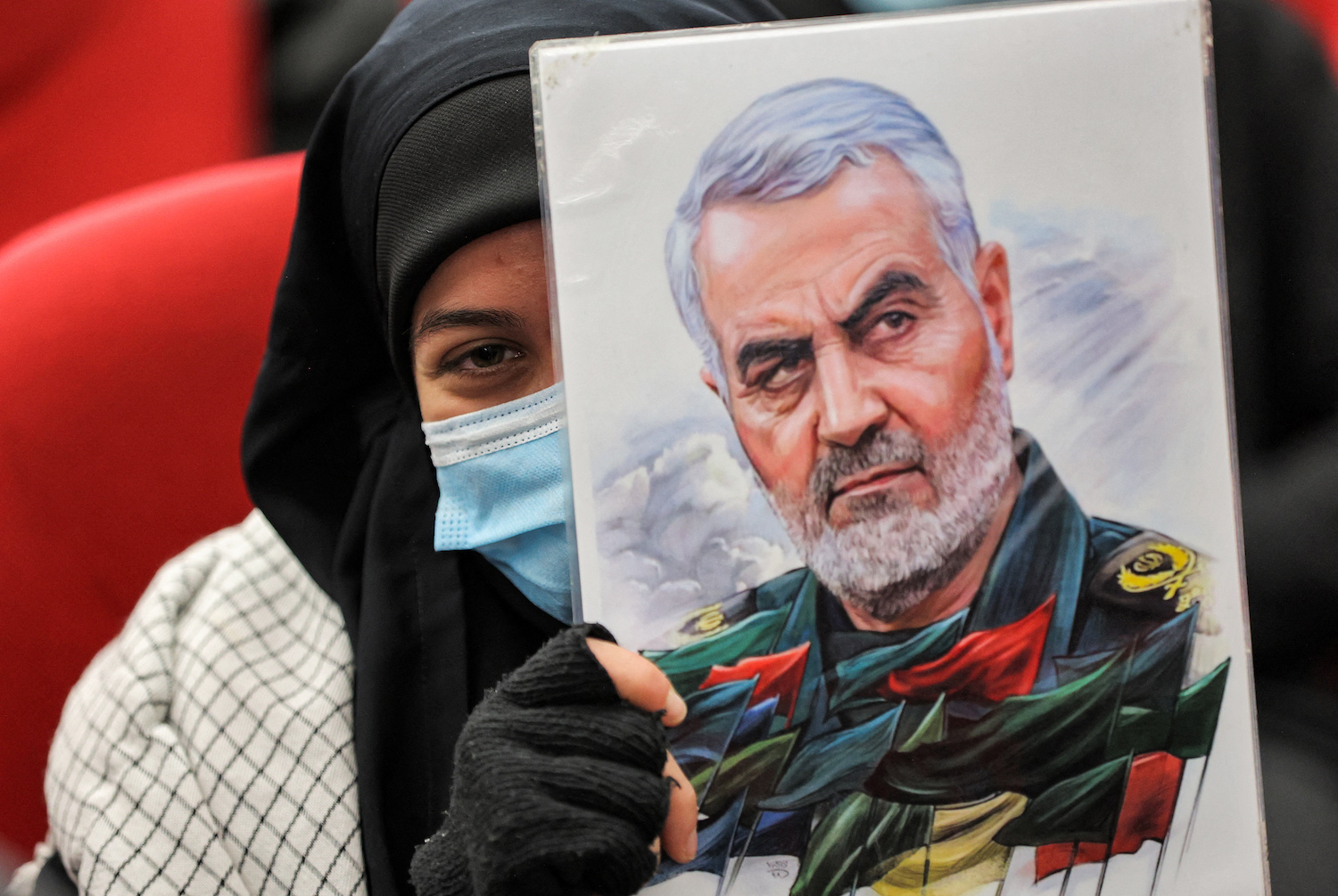
A woman holds up an illustration of a portrait of Qasem Soleimani during a memorial service marking the second anniversary of his death at a school in Beirut. (File/AFP)
Iran has reportedly been pressing the Biden team to agree to an almost total overhaul of not only economic sanctions related to Iran’s nuclear program, but those connected to terrorist activities specifically linked to the IRGC.
Sources report that one of Tehran’s conditions to revive the Joint Comprehensive Plan of Action, the formal name of the nuclear deal, is the removal of the terrorist designation, which equates the IRGC with Daesh, and Al-Qaeda.
The Biden administration has not confirmed the leaks but has made clear it hopes to restore the JCPOA. But there are signs that it may acquiesce to Tehran’s demands.
Critics point to what they see as a serious flaw in the Biden administration’s strategic reasoning.
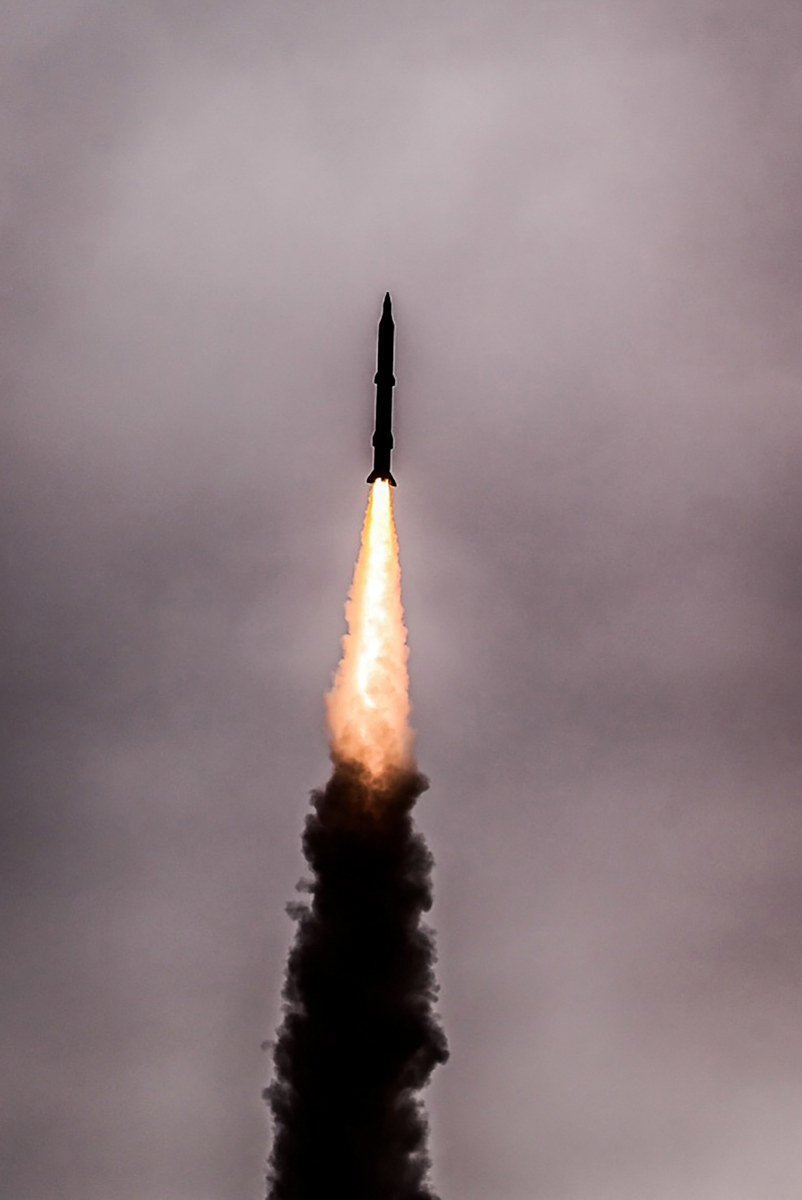
An Iranian missile launched during a joint military drill dubbed the ‘Great Prophet 17,’ in the southwest of Iran. (AFP/Iran's Revolutionary Guard via SEPAH NEWS)
Michael Doran, senior fellow at the Hudson Institute, told Arab News that the deal under consideration by the Biden administration would neither prevent Iran from eventually developing nuclear weapons nor dissuade the IRGC from conducting terror attacks against American and allied interests.
He said: “Biden officials and, before them, (former US President Barack) Obama officials promised us repeatedly that the nuclear deal would not prevent the United States from working to contain the IRGC on the ground in the Middle East.
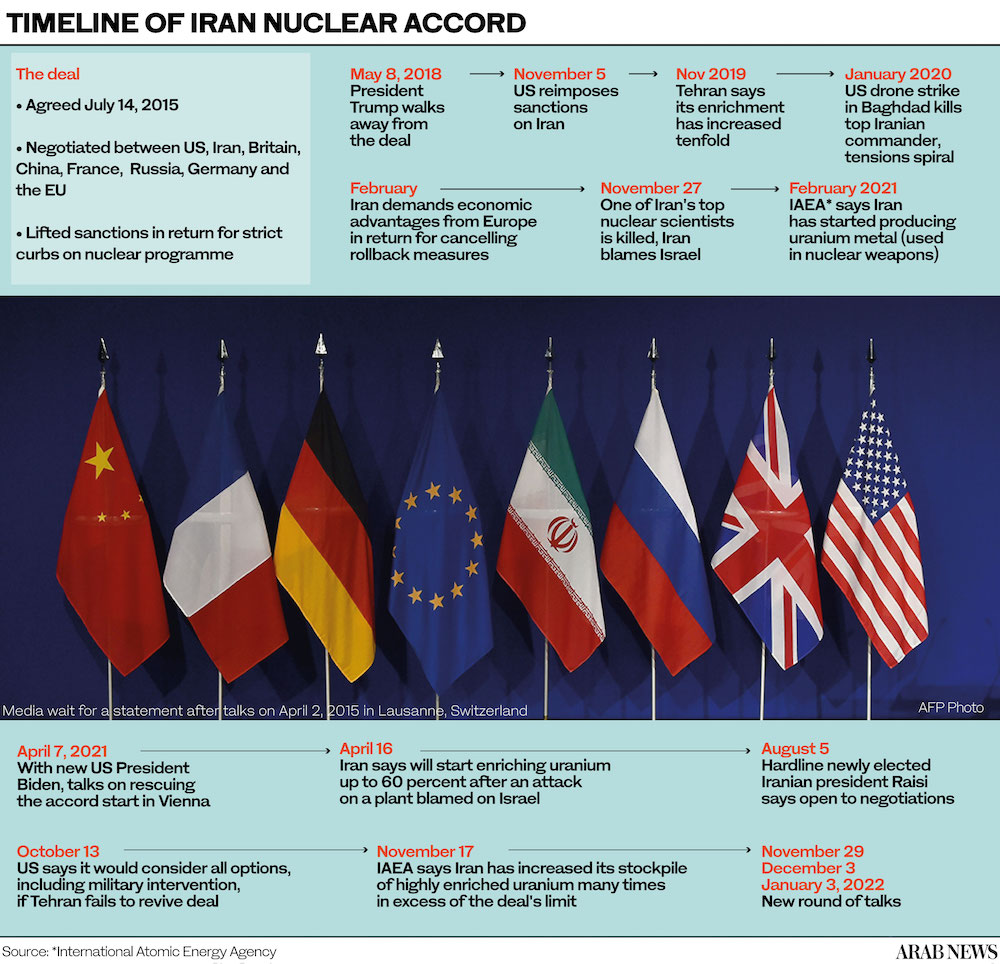
“Clearly, the nuclear deal is about much more than nuclear weapons. It will remove all meaningful restrictions on Iran’s nuclear-weapons program, thus paving the way to Iran’s early acquisition of a nuclear bomb.”
The IRGC was founded as an ideological custodian of Iran’s 1979 revolution and entrusted with defending the Islamic Republic against internal and external threats. Its participation in the Iran-Iraq War in the 1980s led to the expansion of both its role and its might, making it Iran’s dominant military force, with its own army, navy, and air force and, later, its own intelligence wing.

A view of a damaged silo at the Saudi Aramco oil facility in Jeddah, Saudi Arabia after the Houthis launched a missile attack on the facility, triggering an explosion and a fire in a fuel tank. (File/AFP)
Over time, it gained an outsized role in executing Iran’s foreign policy and currently wields control over vast segments of the economy. The IRGC has proven to be a favored tool of Iran’s Supreme Leader Ayatollah Ali Khamenei to launch plausibly deniable asymmetric attacks using cadres and their proxies who are indoctrinated and trained by Iranian operatives with decades of experience in such operations.
Unsurprisingly, the general consensus of analysts was that lifting both nuclear and terror-related sanctions would inevitably lead to a major cash infusion into IRGC coffers that could only be an incentive for expansion of the organization’s terror activities.
“The move allows people and companies connected to the IRGC to engage in business deals with foreign entities with less scrutiny and move money across the globe more easily,” Saeed Ghasseminejad, a senior adviser on Iran at the Foundation for Defense of Democracies, told Arab News.
“This is in addition to tens of billions of dollars that become available to the regime after the deal, which benefits the IRGC as a key stakeholder of the Islamic fundamentalist regime in Tehran.
“Removing the IRGC from the terror list and lifting sanctions on companies connected to it boosts its financial resources, expands its operational capacity, and increases its political power and regional influence,” he said.
Tehran seems to have seized on signals from the Biden administration, which, while publicly claiming that the Vienna process will not be open-ended, has given Iran significant leeway in dragging out the nuclear negotiations in order to gain maximum leverage and concessions.

Iranian crude oil tanker Sabiti sails in the Red Sea. (File/AFP)
“Washington does not seem to be able to say no to Tehran because the Biden administration wants a nuclear deal almost at any price.
“The IRGC is a terrorist organization and has not changed its behavior or mission. What has changed is that Washington is desperate to reach a deal with the ayatollahs,” Ghasseminejad added.
The IRGC has been implicated in attacks against civilians since the 1980s. Its terror operations have, by most accounts, killed thousands of innocent foreigners, targeting Arabs, Israelis, Americans, and Europeans, from Argentina to Thailand.
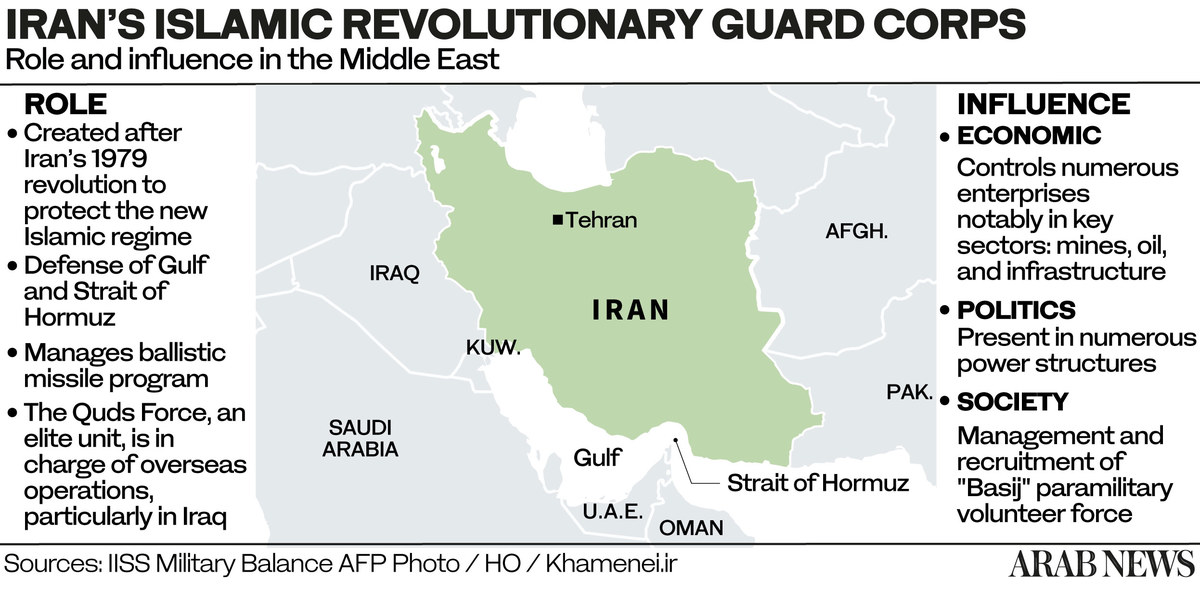
Its proxies, particularly the Houthis in Yemen, and Hezbollah in Lebanon, actively threaten the Arab world, while building missile capabilities that threaten the very existence of Israel. And while the Biden administration has of late condemned indiscriminate Houthi missile attacks on civilian infrastructure and population centers in Saudi Arabia and the UAE, there has been conspicuous silence in the matter of addressing the root of the problem.
Jason Brodsky, policy director of United Against a Nuclear Iran, told Arab News that there were compelling national security reasons for keeping the IRGC on America’s Foreign Terrorist Organizations list.
“The FTO designation carries unique criminal and immigration prohibitions, and thus has a legal distinction that other counterterrorism designations, like Executive Order 13224 (issued by former US President George W. Bush in response to the 9/11 terror attacks in America), lack.
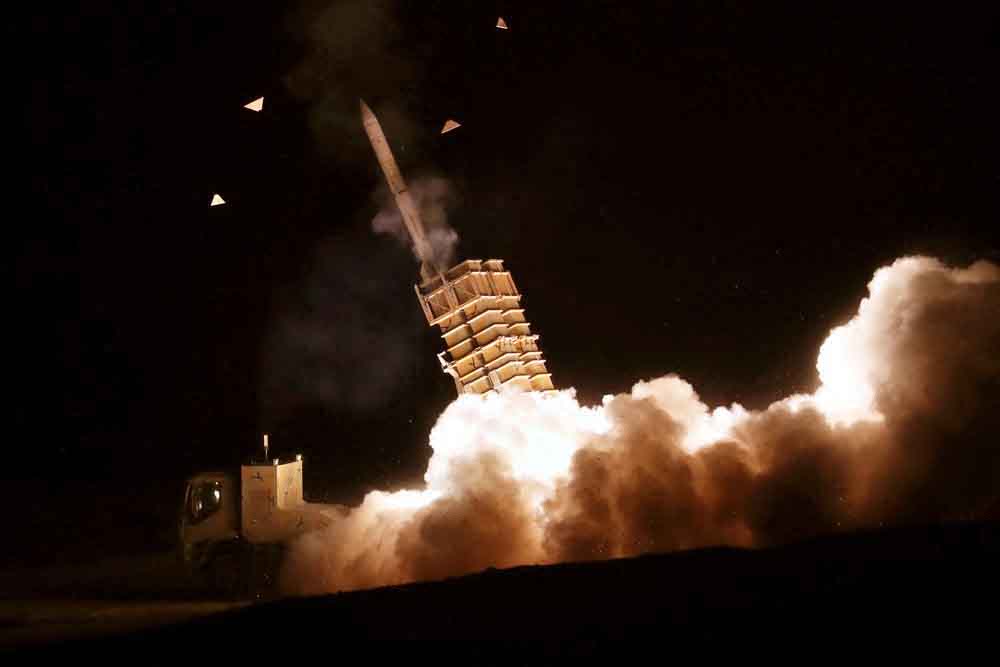
A view of an anti-aircraft missile launcher firing a salvo during a joint military exercise between the Iranian army and the IRGC. (File/AFP)
“Delisting the IRGC in exchange for a mere public commitment to de-escalation would set a troubling precedent as it risks cheapening the FTO list, which designates organizations due to their behavior,” Brodsky said.
He pointed out that the IRGC’s local branches in Iraq, Syria, Lebanon, and Yemen could not be disassociated from the resulting outcome of granting the organization what could be a game-changing strategic concession if approved by Biden.
Terror networks operating under separate names while belonging to a common ideological and operational umbrella overseen by the IRGC would not feel compelled by a nuclear deal to alter their behavior, he added.
“It also makes no sense to delist the mother ship from which manpower, money, and materiel flows — the IRGC — while including its satellites like Hezbollah on the FTO list.
“The (US) Department of State has already had a bad experience after it delisted the Houthis as an FTO, and it awkwardly has had to condemn every Houthi attack while trying to justify the decision. Delisting the IRGC as an FTO would be worse,” Brodsky said.
And he noted that the potential financial windfall resulting from the removal of terror sanctions would also play into internal power dynamics within the Iranian regime.

The IRGC take part in five-days military exercises in three Iranian provinces. (File/AFP)
“I would not underestimate the importance to Iran’s President Ebrahim Raisi of the IRGC’s removal from the FTO list. He harbors ambitions beyond the presidency, specifically the supreme leadership, and he needs the IRGC’s support in that process. This may be one of the reasons why the Iranian establishment has made this a priority,” he added.
In reversing former US President Donald Trump’s “maximum pressure” campaign, could the Biden team then be setting a precedent that might significantly weaken America’s standing and diplomatic influence in the Middle East?
Brodsky said: “In pressing for the IRGC’s removal as an FTO, Tehran is seeking a propaganda victory. Most importantly it sends a terrible message to US allies and partners in the region, with whom relations are already strained on a variety of issues.”

Biden’s predecessor took a decidedly different tack when it came to the question of how to react to threats emanating directly from IRGC plots. For instance, a decision such as the targeted killing in 2019 of the IRGC’s leader and most capable commander, Qassem Soleimani, in response to intelligence that he was preparing an attack on the US embassy in Baghdad, would be impossible to take were the proposed nuclear deal to go ahead.
Len Khodorkovsky, a former senior US State Department official, said the Biden team was making a fundamental negotiating error in not setting clear red lines for Iran.
“President Biden has decided to do whatever it takes to get back into the JCPOA. That desperation has been used by the Iranian regime to extract outlandish concessions. If you want to know what the IRGC will do after its delisting, just look at what the Houthis have done. Terrorists will always do what they do best — terrorize people,” Khodorkovsky added.
Put simply, if a nuclear deal is signed under the current conditions, Iran’s missiles would continue to threaten Jeddah, Abu Dhabi, Baghdad, Irbil, and Tel Aviv while its long terror arm will be thrown a financial lifeline that will enable it to plunge vast new swathes of the Middle East deeper into chaos and conflict.














